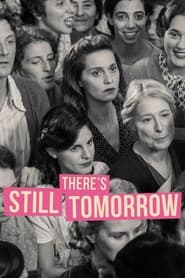Clumsy and infuriating Ferrantesploitation that has booby-trapped itself against easy criticism.
The main driver of tension throughout the ungraceful There's Still Tomorrow's is whether 'Bad Man' Ivano (played as one-note as a Disney villain) will hit our saintly protagonist, Delia. Clumsy, one-dimensional characters, group dynamics and politics abound throughout: the women are all liberals or, at worse, play-acting as communists, whilst all the men turn out, of course, to be machismos or ex-fascists. Indeed, the film gestures towards a feminism of a kind, but it's too reductive and clumsy with its understanding of what patriarchy might be other than involving men hitting women, and patriarchy magically activating in men of a certain age for unknown reasons. As a 'feminist' film, There's Still Tomorrow lacks as much meat as Delia's ditalini lasagne, and all the empty calories of the Moretti's engagement pastries.
This, of course, doesn't make the film unique; it is merely exploitative of very real and very serious domestic violence against women that persists to the present day. What might be unique, however, is how Delia's beatings are portrayed on-screen. I do applaud the filmmakers for making an attempt to find a new cinematic represation of intimate partner violence, but the result is... well, I lack the intellectual apparatus to describe exactly what might be wrong with it, but there's a certain lack of levity involved in depicting domestic violence on-screen as a kind of experimental/fantastical dance routine replete with CGI that heals her wounds within a few seconds as if treated by water from the grail of The Last Crusade. There are surely hard limits to what can be 'reclaimed' about the material reality of being beaten up, and it feels like the screenplay has garbled or misunderstood a feminist idea that was poorly remembered from a college class.
It's the ending that really got my goat, though. The viewer is deliberately misled throughout the movie into thinking that Delia is counting the courage, money (and bruises) to justify escaping her abusive relationship, weighing that up against leaving her family behind. But the film pulls the rug out in the final five minutes with the surprise that she was actually secretly preparing to vote in Italy for the first time. Gotcha! The film abruptly switches itself into a markedly self-righteous mode, highly emboldened as it has just armour-plated itself against all critique — "What are you... against women voting or something?!"
This armour is not very thick once you poke at it. A fictional film has no requirement to be an accurate history lesson, but whoever granted women the vote in 1946 is not explained in the rather sanctimonious subtitles. In the absence of this information, the audience is primed to infer that this was a gift of a benevolent and paternalistic state — presumably after seeing what a girlboss Delia was. (That this same state has previously been completely invisible and useless to Delia is lost on the film.) Indeed, what (or whom) the women might be voting for is equally unexplained, and we are left with a purely feel-good "voting is good" ending — the only thing missing was an on-screen directive to clap.
(In fact, it's somewhat worse when you think about the film a little more, as not only are we left with the obvious question of "But if voting is so good, how come we still have domestic violence?", we are also somehow expected to believe that it was a harmless and racially integrated occupying American army that gave Italian women the vote.)
Setting aside the scrubbing of (and gross slander against) the long feminist and communist struggle for the right to vote in Italy, what actually led to universal suffrage is obviously outside the scope of this review. Yet, as Rossi Doria suggests:
It seems likely that questions of party politics, in particular the overall strategies of the two mass parties – communists and Christian Democrats – were far more important than a real commitment to women’s rights. Indeed, the Christian Democrats consistently presented voting as a new duty for women rather than a right, the duty to defend the family against the threat of communism. The Catholics warned repeatedly against feminist interpretations of the vote, in particular emphasising the separate nature of the granting of female suffrage and the question of divorce. In this context, stripped of discourses of equality, the limitations of what the vote initially brought women are hardly surprising.
Anyway, much has been made about the film's nods towards the neorealismo movement, yet it's difficult to shake the feeling that There's Still Tomorrow only has a superficial grasp of Italian neorealism and has no real understanding of what using Academy ratio in black-and-white might 'mean' in 2023, merely borrowing the prestige that culture has bestowed upon those classic films. (And we don't quite have the cinematography of Roma or The Lighthouse to compensate, alas) There is a distinct lost opportunity here because postmodern anachronisms have the ability to puncture the spurious integrity we would like to confer on history, and "perhaps it’s in film that anachronism can give the most effective jolt of energy." Yet there's something vacuous and ill-thought-through about the conspiciously modern touches here, and the use of pointedly Black African-American music genres for some needledrops feels decidedly suspect.

